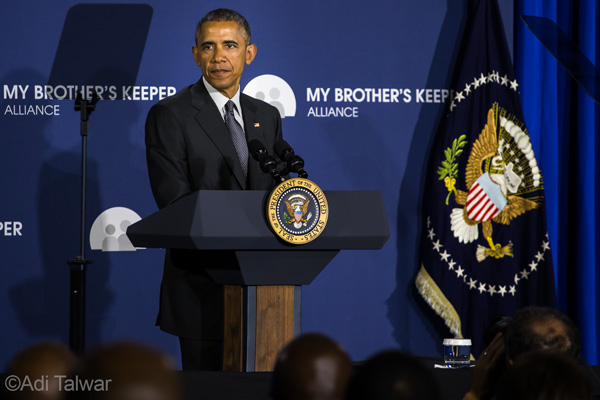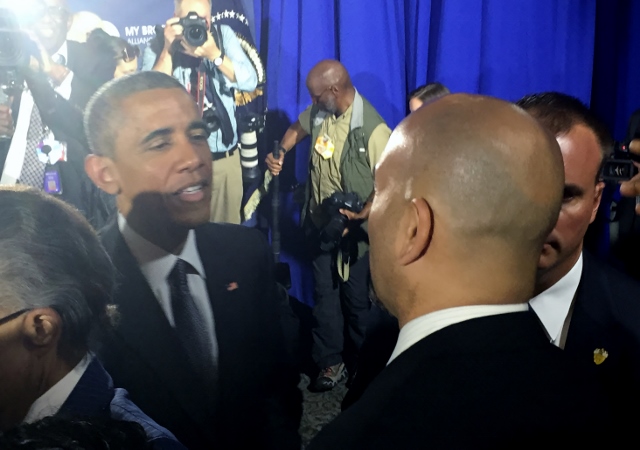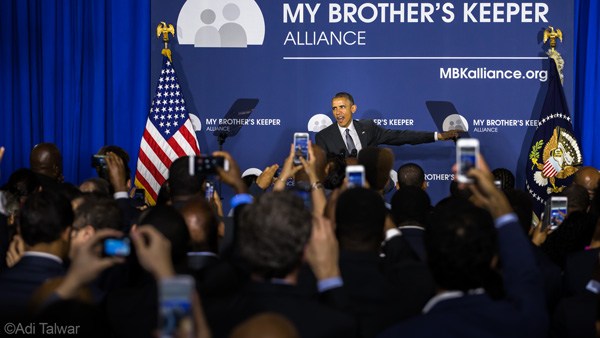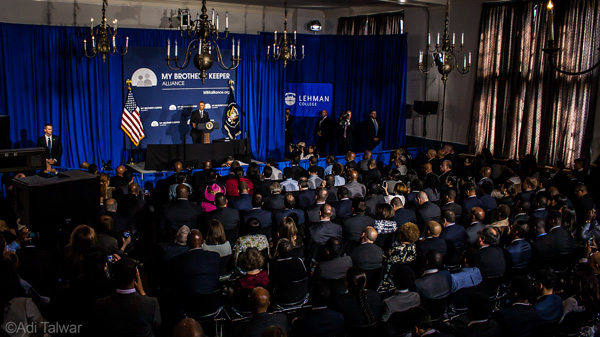
Photo by Adi Talwar
By DAVID CRUZ
In his first, and perhaps, only stop to the Bronx, President Barack Obama visited Lehman College in Bedford Park to promote a non-profit aimed at reversing the disproportionate ill fates of minority men, a topic that continues to resonate in Bronx communities.
Amid a state where the graduation rate among black and Hispanic men hovers at 59 percent, and a national incarceration rate among blacks nearly six times as whites, Mr. Obama announced the launch of the My Brother’s Keeper Alliance (MBKA) on May 4. It’s an offshoot to the White House’s initiative of the same name. For a half hour, Mr. Obama outlined the nonprofit’s vision that helps steer young men toward a life of prosperity by focusing on early childhood education.
“In every community in America, there are young people with incredible drive and talent, and they just don’t have the same kinds of chances that somebody like me had,” said Mr. Obama, delivering remarks at the campus’s music building. “They’re just as talented, just as smart. They don’t get a chance.”
The White House version of the My Brother’s Keeper Alliance launched in February 2014, intended as a national mentoring program for black and Hispanic men. That program helped bring in donations totaling $300 million. For the newly created program, $80 million has been committed to sustain the program, with corporate monies largely funding the nonprofit. Some corporate sponsors include PepsiCo and Sprint while advisory members include retired NBA player Alonzo Mourning and singer/songwriter John Legend.

Photo courtesy Borough President Ruben Diaz Jr.
The initiative was well received by local officials, several of whom were present at the event. Borough President Ruben Diaz Jr., a legislator with a Puerto Rican background, was among the guests present for Mr. Obama’s speech. He sat by Speaker Carl Heastie, and Rev. Al Sharpton, later chatting with Mr. Obama moments after the speech.
“I know firsthand the struggles young men of color face in this nation, and I know how challenging it can be to both lead one’s own life on the right path while also guiding others in that same direction,” said Diaz in a statement. “This initiative, which will combine public and private resources for the greater good, is welcome not only in the Bronx but across the United States.”
The tone taken by Mr. Obama appeared more acutely personal, evoking a bold stance on the personal struggles of minority men plunging into a hole of disparity, which he argued could start at birth. The first black U.S. President, Mr. Obama has waged a campaign to level the playing field for minority men, who often feel left out.

Photo by Adi Talwar
“That sense of unfairness and of powerlessness of people not hearing their voices, that’s helped fuel some of the protests that we’ve seen in places like Baltimore and Ferguson and right here in New York,” said Mr. Obama.
Presidential visits to the Bronx are seldom. Indeed, the last Bronx visit by a sitting U.S. President happened on October 30, 2001, after then President George W. Bush threw the first pitch at Yankee Stadium during Game 3 of the World Series. It was a rare visit by a U.S. President, whose attentions are often focused on states where party loyalty can be skittish. Unlike Mr. Bush’s visit, which served as symbol to America’s vitality following the 9/11 attacks, Mr. Obama’s visit underscored a racial discrepancy that’s experienced throughout communities in the Bronx.
Ahead of Mr. Obama’s remarks, Board members for MBKA met face to face with several students from Lehman College at a closed-door meeting. There, a type of straight talk took shape, with members sitting at a round table to espouse the benefits of succeeding.
“You matter,” Mr. Obama told the crowd of young men, including those from Lehman College’s Urban Male Leadership program.

Photo by Adi Talwar
Mr. Obama’s participation seemed to offer a glimpse into his future. In his speech, Mr. Obama noted that he plans on being fully committed to MBKA once he leaves office. Until then, Mr. Obama will have no role in the alliance nor how donations are screened, a measure that avoids any conflicts of interest.
Mr. Obama’s visit to the Bronx comes at a time when young minority men in Bedford Park have met grisly fates.
In early April, 17-year-old Hakeem Kuta fell to his death from a rooftop as he eluded police for smoking pot inside a Valentine Avenue building. A month before, 18-year-old Jonathan Martinez was killed by gunfire in the same block as where Kuta perished.
The two victims were young minority men.




